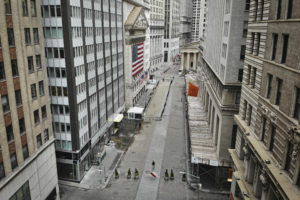MANILA, Philippines — The Philippine economy may contract in the second quarter as a result of the lockdown imposed by the government to contain the spread of the COVID-19 disease, the country’s chief economist said.
“A recession can’t be ruled out,” Socioeconomic Planning Secretary and National Economic and Development Authority (Neda) chief Ernesto M. Pernia told the Inquirer.
While a recession meant two consecutive quarters of year-on-year contraction in gross domestic product, the government during President Joseph Estrada’s administration had opted to use another definition and denied the economy underwent recession even as the Philippines’ GDP shrank during two straight quarters in 1998.
As far as the month-long enhanced community quarantine being implemented in Luzon and other parts of the country until mid-April was concerned, Pernia said it would slash GDP during “one quarter at least, the second quarter.”
Pernia did not give an estimate of the potential GDP reduction for the April to June period, saying that it would be “better to wait towards the end of the current one-month quarantine; for instance, if it’s extended.”
The quarantine was already taking a toll on manufacturing with over 700 factories in Luzon shut down as of last week, leaving thousands of workers jobless.
London-based Capital Economics expects the Philippine economy to contract during the third and fourth quarters.
Capital Economics Asia economist Alex Holmes told the Inquirer last Friday that the London-based economic research firm projected the Philippines’ gross domestic product (GDP) growth to slow to 4.7 percent year-on-year in the first quarter.
Its estimates further showed GDP could contract by 3 percent year-on-year during the second quarter and 1.1 percent in the third quarter.
The Philippine economy was expected to recover by the fourth quarter, but by a mere 0.7-percent growth.
In a report last Thursday, Holmes said the Philippine economy would “barely grow at all in 2020 as a whole” since consumption, tourism, external trade, foreign direct investment (FDI), and remittances from Filipinos overseas would all take a hit.
The government targets 6.5-7.5 percent GDP growth this year, but all forecasts by private economists see expansion falling below goal.
On Monday, economists at the Ateneo de Manila University said “an economic recession for 2020 is not unimaginable,” such that they urged the government to shell out additional funding worth at least P220 billion to arrest COVID-19’s impact on the Philippine economy.
Capital Economics nonetheless sees growth rebound next year—3.7 percent year-on-year in the first quarter of 2021, 12.5 percent in the second quarter, 9.9 percent in the third quarter, and 7.4 percent in the fourth quarter, Holmes said.


